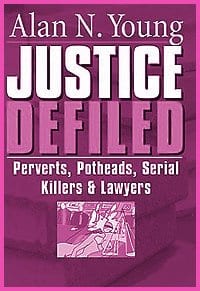Many of us, especially in the queer communities, have at some point wondered about the role of criminal law in our everyday life. Does the law control us, or do we control and influence the law? Is it a mobilizing force that furthers our aims or is it damaging to the communities we belong to?
Alan N Young, an Osgoode Hall law professor, aims to answer some of these questions and offers a personal, controversial and satirical book that fundamentally challenges Canada’s criminal justice system. He was the lawyer who unsuccessfully defended SM madame Terri-Jean Bedford against bawdy-house charges and who has advocated for medical marijuana users.
Justice Defiled: Perverts, Potheads, Serial Killers And Lawyers is an absolute delight to read. Each of the four parts of the book addresses a different issue and contains historical reflection as well as a highly critical analysis of the current legislation and prosecution of drug use, prostitution, sexuality and murder.
Using court cases as examples, Young argues that the criminal justice system is ineffective, and based on intellectual dishonesty among judges, lawyers and clients. The overwhelming number of minor concerns brought before the courts, like common assault, petty theft, drug use or certain personal sexual tastes, “clog the system leaving it unable to effectively deal with more serious crimes” like murder.
For Young, lawyers are nothing but knowledge elites, who leave law school, the “training ground for neuroses,” in debt and unprepared to handle cases and court battles well. Writes Young: “When you hire a lawyer, all you are really doing is getting someone else to complain on your behalf.”
In the current context of increased commercialization and consumerism, lawyers have become yet another commodity. The police and court trials have become the ultimate problem solvers. A lot of money is spent to no effect; we still have crime, while, for example, people who are in need of drug rehab do not get it and end up in prison. Why?
Among other factors, Young blames the outdated draconic principles and religious claims on which Canada’s Criminal Code is based. These principles worked well for the time and context when they were written, but have lost their relevance and application in today’s world. Thus, Young argues, the system and the Criminal Code are more of a limitation than an answer to the problems they try to address.
What puzzles Young is that while there have been some progressive changes in Canada’s criminal law – laws pertaining to marital rape, for example – other issues like drugs and certain kinds of sex are still dealt with in the context of backward principles based in archaic ideals. Why are those laws being overlooked in reforms? Why are certain acts or groups prosecuted more than others?
One way in which Young explores the issue is by looking at the practice of scapegoating. Fear is very powerful way to control a population. Fearing of a group or the demonization of an act “allows people to regain an illusion of control over their life” by having someone to blame for all the social ills. By controlling information and creating hysteria in the population, the state peddles fear and resentment against the group, and thus maintains social order and control.
So the state can turn “the drug addict” or “the homosexual” from a regular person into a criminal in order to attract attention away from its inability to combat many social ills and maintain social order and control.
The book is especially relevant to the queer communities. Young explores some of the historical ways in which certain acts, like anal sex, have been demonized and are still used in court cases as ways of portraying a person as immoral or careless, thus allowing the state and the police unlimited access and control over our personal and intimate lives. The criminal justice system might be a well-designed machine, but it’s doubtful the machine produces what was intended: justice, equality and social order. Instead of relying on the criminal justice system, Young suggests that many issues can be better resolved among the affected parties themselves or through interventions like social services and educational campaigns.
Justice Defiled is as much of a lesson in legal history as it is a reflection on our legal system. For me, Young offers more questions than answers, though he does have interesting suggestions for legal reform.
To the layperson, Justice Defiled may coherently structure and put in words the sentiments and percepetions he or she has regarding law, lawyers, the court system and cases. It’s not only a call for an examination of the legal system and its pitfalls. It’s also a call for self-reflection and careful evaluation of who we are, what we do and what we would like to achieve when we use the legal system – no matter who “we” are.
JUSTICE DEFILED: PERVERTS, POTHEADS, SERIAL KILLERS & LAWYERS.
By Alan N Young.
Key Porter.
304 pages. $36.95.

 Why you can trust Xtra
Why you can trust Xtra


